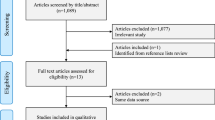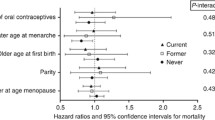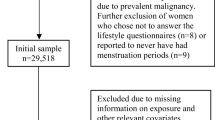Abstract
Background
Gastric cancer incidence is higher in men, and a protective hormone-related effect in women is postulated. We aimed to investigate and quantify the relationship in the Stomach cancer Pooling (StoP) Project consortium.
Methods
A total of 2,084 cases and 7,102 controls from 11 studies in seven countries were included. Summary odds ratios (ORs) and 95% confidence intervals (CIs) assessing associations of key reproductive factors and menopausal hormone therapy (MHT) with gastric cancer were estimated by pooling study-specific ORs using random-effects meta-analysis.
Results
A duration of fertility of ≥ 40 years (vs. < 20), was associated with a 25% lower risk of gastric cancer (OR = 0.75; 95% CI: 0.58–0.96). Compared with never use, ever, 5–9 years and ≥ 10 years use of MHT in postmenopausal women, showed ORs of 0.73 (95% CI: 0.58–0.92), 0.53 (95% CI: 0.34–0.84) and 0.71 (95% CI: 0.50–1.00), respectively. The associations were generally similar for anatomical and histologic subtypes.
Conclusion
Our results support the hypothesis that reproductive factors and MHT use may lower the risk of gastric cancer in women, regardless of anatomical or histologic subtypes. Given the variation in hormones over the lifespan, studies should address their effects in premenopausal and postmenopausal women. Furthermore, mechanistic studies may inform potential biological processes.




Similar content being viewed by others
Data availability
The data underlying this article are subject to restrictions, as they were used under license for this study and so are not publicly available. However, they will be shared on reasonable request to the authors and after permission of the Steering Committee of the StoP Project.
Abbreviations
- BMI:
-
Body mass index
- CI:
-
Confidence interval
- DHEA:
-
Dehydroepiandrosterone
- FFQs:
-
Food frequency questionnaires
- HR:
-
Hazard ratio
- MHT:
-
Menopausal hormone therapy
- OR:
-
Odds ratio
- StoP Project:
-
Stomach cancer Pooling Project
References
Sung H, Ferlay J, Siegel RL et al (2021) Global cancer statistics 2020: GLOBOCAN Estimates of incidence and mortality worldwide for 36 cancers in 185 countries. CA Cancer J Clin 71:209–249
Thrift AP, El-Serag HB (2020) Burden of gastric cancer. Clin Gastroenterol Hepatol 18:534–542
Allemani C, Weir HK, Carreira H et al (2015) Global surveillance of cancer survival 1995–2009: analysis of individual data for 25,676,887 patients from 279 population-based registries in 67 countries (CONCORD-2). Lancet 385:977–1010
de Martel C, Forman D, Plummer M (2013) Gastric cancer: epidemiology and risk factors. Gastroenterol Clin North Am 42:219–240
Sipponen P, Correa P (2002) Delayed rise in incidence of gastric cancer in females results in unique sex ratio (M/F) pattern: etiologic hypothesis. Gastric Cancer 5:213–219
Cancer Genome Atlas Research N (2014) Comprehensive molecular characterization of gastric adenocarcinoma. Nature 513:202–209
Freedman ND, Ahn J, Hou L et al (2009) Polymorphisms in estrogen- and androgen-metabolizing genes and the risk of gastric cancer. Carcinogenesis 30:71–77
Ishigaki K, Akiyama M, Kanai M et al (2020) Large-scale genome-wide association study in a Japanese population identifies novel susceptibility loci across different diseases. Nat Genet 52:669–679
WCRF/AICR. (2018) Continuous Update Project - Diet, Nutrition, Physical Actitivy and Stomach Cancer.
Camargo MC, Goto Y, Zabaleta J, Morgan DR, Correa P, Rabkin CS (2012) Sex hormones, hormonal interventions, and gastric cancer risk: a meta-analysis. Cancer Epidemiol Biomarkers Prev 21:20–38
Pelucchi C, Lunet N, Boccia S et al (2015) The stomach cancer pooling (StoP) project: study design and presentation. Eur J Cancer Prev 24:16–23
Palli D, Galli M, Caporaso NE et al (1994) Family history and risk of stomach cancer in Italy. Cancer Epidemiol Biomarkers Prev 3:15–18
La Vecchia C, D’Avanzo B, Negri E, Decarli A, Benichou J (1995) Attributable risks for stomach cancer in northern Italy. Int J Cancer 60:748–752
Lagiou P, Samoli E, Lagiou A et al (2004) Flavonoids, vitamin C and adenocarcinoma of the stomach. Cancer Causes Control 15:67–72
Mao Y, Hu J, Semenciw R, White K, Canadian Cancer Registries Epidemiology Research G. (2002) Active and passive smoking and the risk of stomach cancer, by subsite, in Canada. Eur J Cancer Prev 11:27–38
Zaridze D, Borisova E, Maximovitch D, Chkhikvadze V (2000) Alcohol consumption, smoking and risk of gastric cancer: case-control study from Moscow. Russia Cancer Causes Control 11:363–371
Castano-Vinyals G, Aragones N, Perez-Gomez B et al (2015) Population-based multicase-control study in common tumors in Spain (MCC-Spain): rationale and study design. Gac Sanit 29:308–315
Nishimoto IN, Hamada GS, Kowalski LP et al (2002) Risk factors for stomach cancer in Brazil (I): a case-control study among non-Japanese Brazilians in Sao Paulo. Jpn J Clin Oncol 32:277–283
Hamada GS, Kowalski LP, Nishimoto IN et al (2002) Risk factors for stomach cancer in Brazil (II): a case-control study among Japanese Brazilians in Sao Paulo. Jpn J Clin Oncol 32:284–290
Foschi R, Lucenteforte E, Bosetti C et al (2008) Family history of cancer and stomach cancer risk. Int J Cancer 123:1429–1432
Ward MH, Heineman EF, Markin RS, Weisenburger DD (2008) Adenocarcinoma of the stomach and esophagus and drinking water and dietary sources of nitrate and nitrite. Int J Occup Environ Health 14:193–197
Schatzkin A, Subar AF, Thompson FE et al (2001) Design and serendipity in establishing a large cohort with wide dietary intake distributions: the national institutes of health-american association of retired persons diet and health study. Am J Epidemiol 154:1119–1125
Praud D, Rota M, Pelucchi C et al (2018) Cigarette smoking and gastric cancer in the stomach cancer pooling (StoP) project. Eur J Cancer 27:124–133
Rota M, Pelucchi C, Bertuccio P et al (2017) Alcohol consumption and gastric cancer risk-A pooled analysis within the StoP project consortium. Int J Cancer 141:1950–1962
Morais S, Costa A, Albuquerque G et al (2022) Salt intake and gastric cancer: a pooled analysis within the stomach cancer pooling (StoP) Project. Cancer Causes Control 33:779–791
Ferro A, Costa AR, Morais S et al (2020) Fruits and vegetables intake and gastric cancer risk: a pooled analysis within the stomach cancer pooling project. Int J Cancer 147:3090–3101
Smith-Warner SA, Spiegelman D, Ritz J et al (2006) Methods for pooling results of epidemiologic studies: the pooling project of prospective studies of diet and cancer. Am J Epidemiol 163:1053–1064
DerSimonian R, Laird N (1986) Meta-analysis in clinical trials. Control Clin Trials 7:177–188
Higgins JP, Thompson SG (2002) Quantifying heterogeneity in a meta-analysis. Stat Med 21:1539–1558
Orsini N, Li R, Wolk A, Khudyakov P, Spiegelman D (2012) Meta-analysis for linear and nonlinear dose-response relations: examples, an evaluation of approximations, and software. Am J Epidemiol 175:66–73
Jang YC, Leung CY, Huang HL (2022) Association of hormone replacement therapy with risk of gastric cancer: a systematic review and meta-analysis. Sci Rep 12:12997
Duell EJ, Travier N, Lujan-Barroso L et al (2010) Menstrual and reproductive factors, exogenous hormone use, and gastric cancer risk in a cohort of women from the European prospective investigation into cancer and nutrition. Am J Epidemiol 172:1384–1393
Sanikini H, Muller DC, Sophiea M et al (2020) Anthropometric and reproductive factors and risk of esophageal and gastric cancer by subtype and subsite: results from the European prospective investigation into cancer and nutrition (EPIC) cohort. Int J Cancer 146:929–942
Green J, Czanner G, Reeves G et al (2012) Menopausal hormone therapy and risk of gastrointestinal cancer: nested case-control study within a prospective cohort, and meta-analysis. Int J Cancer 130:2387–2396
Baek C, Kim JE, Shin A, Choi JY (2022) Association of menopausal hormone therapy with gastric and colorectal cancer risks in Korean women: a nationwide population-based cohort study. Maturitas 166:35–40
Petrick JL, Hyland PL, Caron P et al (2019) Associations between prediagnostic concentrations of circulating sex steroid hormones and esophageal/gastric cardia adenocarcinoma among men. J Natl Cancer Inst 111:34–41
Leal YA, Song M, Zabaleta J et al (2021) Circulating levels of sex steroid hormones and gastric cancer. Arch Med Res 52:660–664
Sulcova J, Hill M, Hampl R, Starka L (1997) Age and sex related differences in serum levels of unconjugated dehydroepiandrosterone and its sulphate in normal subjects. J Endocrinol 154:57–62
Carlstrom K, Brody S, Lunell NO et al (1988) Dehydroepiandrosterone sulphate and dehydroepiandrosterone in serum: differences related to age and sex. Maturitas 10:297–306
Labrie F, Belanger A, Cusan L, Gomez JL, Candas B (1997) Marked decline in serum concentrations of adrenal C19 sex steroid precursors and conjugated androgen metabolites during aging. J Clin Endocrinol Metab 82:2396–2402
Yen SSCJR, Barbieri RL (1999) Reproductive endocrinology: physiology, pathophysiology, and clinical management, 4th edn. Saunders, Philadelphia
McMenamin UC, Liu P, Kunzmann AT et al (2021) Circulating Sex Hormones are associated with gastric and colorectal cancers but not esophageal adenocarcinoma in the UK biobank. Am J Gastroenterol 116:522–529
Camargo MC, Song M, Xu X et al (2022) Urinary estrogen metabolites and gastric cancer risk among postmenopausal women. Cancer Rep (Hoboken) 5:e1574
Matsuyama S, Ohkura Y, Eguchi H et al (2002) Estrogen receptor beta is expressed in human stomach adenocarcinoma. J Cancer Res Clin Oncol 128:319–324
Tokunaga A, Kojima N, Andoh T et al (1983) Hormone receptors in gastric cancer. Eur J Cancer Clin Oncol 19:687–689
Taupin D, Podolsky DK (2003) Trefoil factors: initiators of mucosal healing. Nat Rev Mol Cell Biol 4:721–732
Pricci M, Linsalata M, Russo F et al (2001) Effects of 17beta-estradiol administration on apoptosis and polyamine content in AGS cell line. Anticancer Res 21:3215–3220
Yeretssian G, Doiron K, Shao W et al (2009) Gender differences in expression of the human caspase-12 long variant determines susceptibility to Listeria monocytogenes infection. Proc Natl Acad Sci USA 106:9016–9020
Sakaue S, Kanai M, Tanigawa Y et al (2021) A cross-population atlas of genetic associations for 220 human phenotypes. Nat Genet 53:1415–1424
Ohtani M, Ge Z, Garcia A et al (2011) 17 beta-estradiol suppresses Helicobacter pylori-induced gastric pathology in male hypergastrinemic INS-GAS mice. Carcinogenesis 32:1244–1250
Acknowledgements
The authors thank the European Cancer Prevention Organization for providing support for the project meetings.
Funding
The StoP Project was funded by the AIRC (Associazione Italiana per la Ricerca sul Cancro) Foundation (Project number 21378, Investigator Grant), the Italian Ministry of Health (Grant RF-2021-12373951) and the Italian Ministry of University and Research (PRIN 2022, Grant 2022A4WZFC). This study was partially funded by the Intramural Program of the National Cancer Institute, United States.
Author information
Authors and Affiliations
Contributions
MS and MCC led study conceptualization and design. CSR, KCJ, JH, DP, MF, LML, RB, DZ, DM, NA, VM, GC-V, MG, ST, GSH, AH, EN, MHW, RS, AL, PL, and CLV collected the original data and provided them to StoP. CP, RB and EN, members of the StoP coordinating center harmonized core variables and contributed to database management. MS harmonized the data on reproductive factors and performed the statistical analysis. MS and HJ drafted the manuscript. All authors contributed to data interpretation and critical revision of the manuscript for important intellectual content. All authors read and approved the final version of the manuscript. MCC was responsible for study supervision.
Corresponding author
Ethics declarations
Conflict of interest
The authors have no conflicts of interest to declare.
Ethical approval
All participating studies previously received ethical approval from their local Institutional Review Boards (IRBs).
Consent to participate
Written informed consent was obtained from all participants in this study.
Additional information
Publisher's Note
Springer Nature remains neutral with regard to jurisdictional claims in published maps and institutional affiliations.
Supplementary Information
Below is the link to the electronic supplementary material.
10552_2023_1829_MOESM1_ESM.pdf
Supplementary file1 (PDF 24 KB)— Sensitivity analysis assessing associations between selected reproductive factors and overall gastric cancer in the Stomach cancer Pooling (StoP) Project based on using pooled individual-level data. Study-specific models adjusted for age, smoking, alcohol use, vegetable intake, salt intake, family history of gastric cancer, and socioeconomic status. OR, odds ratio, 95% CI, confidence interval, MHT menopausal hormone therapy
10552_2023_1829_MOESM3_ESM.pdf
Supplementary file3 (PDF 17 KB)—Associations between age at first full-term pregnancy and corresponding interval from menarche and overall gastric cancer risk among parous women in the Stomach cancer Pooling (StoP) Project. Study-specific models adjusted for age, smoking, drinking, vegetable intake, salt intake, family history of gastric cancer, and socioeconomic status. OR, odds ratio, 95% CI, confidence interval, menopausal hormone therapy
Rights and permissions
About this article
Cite this article
Song, M., Jayasekara, H., Pelucchi, C. et al. Reproductive factors, hormonal interventions, and gastric cancer risk in the Stomach cancer Pooling (StoP) Project. Cancer Causes Control 35, 727–737 (2024). https://doi.org/10.1007/s10552-023-01829-1
Received:
Accepted:
Published:
Issue Date:
DOI: https://doi.org/10.1007/s10552-023-01829-1




